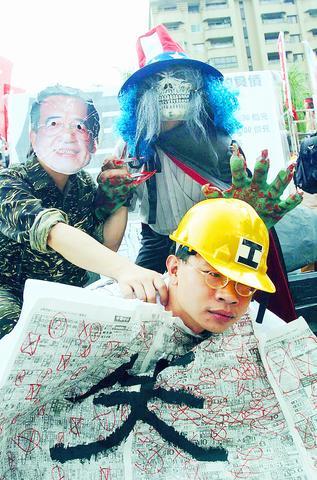Taiwan should rely on a Cold War-style "balance of terror" to safeguard national security in the face of intimidation from Beijing, Premier Yu Shyi-kun said yesterday in response to a rally against his proposed arms-procurement package.
"The best scenario will see a `balance of terror' being maintained across the Taiwan Strait so that the national security is safeguarded," Yu said. "If you fire 100 missiles at me, I should be able to fire at least 50 at you. If you launch an attack on ... Kaohsiung, I should be able to launch a counterattack on Shanghai."

PHOTO: CHIANG YING-YING, TAIPEI TIMES
Unfortunately, Yu said, during Chinese Nationalist Party (KMT) rule Taiwan failed to develop a counterattack capability comparable to that of Israel.
"That's why the NT$610.8 billion [US$18 billion] arms-procurement budget we're seeking from the legislature is necessary, because it'll keep us safe for at least 30 years, based on a study by the Ministry of National Defense," Yu said. "It seems like a good deal, because it'll cost an average of only NT$20 billion a year."
Yu said that the main purpose of the procurements was to sustain national development. Without it, he said, the nation may end up like Hong Kong.
"Arms procurement is necessary, otherwise many problems are bound to result, and it is our child-ren who will have to pay the price and shoulder the consequences," he said.
Responding to opposition criticism that the amount being spent was outrageously high, Yu called on the public to understand that US arms dealers were always going to make a profit from the deal.
"The US government is the only country in the world who has the guts to sell us weapons," Yu said. "We have to understand that it's a seller's market and that we have very limited space in which to haggle."
Cabinet Spokesman Chen Chi-mai (
"The weapons-procurement project is necessary because China has racked up double-digit increases to its military budget every year since 1995, while we have been cutting military spending," Chen said.
"We're very worried about the defeatism embraced by certain people. We hope they come to real-ize that there's no such thing as a free lunch: If you want peace and security, you have to pay for it," he said.
KMT Chairman Lien Chan (連戰), however, said that the time was not right for the legislature to handle the request and that the Cabinet should be using the budget for other things.
"The government should be allocating the nation's limited resources to solve urgent social problems such as unemployment, poverty and education to make the country a better place," he told the party's national congress yesterday morning.
Lien said that the amount the Cabinet requested would increase over time because of "maintenance fees."
Also See Story:
Thousands protest against arms deal

DAREDEVIL: Honnold said it had always been a dream of his to climb Taipei 101, while a Netflix producer said the skyscraper was ‘a real icon of this country’ US climber Alex Honnold yesterday took on Taiwan’s tallest building, becoming the first person to scale Taipei 101 without a rope, harness or safety net. Hundreds of spectators gathered at the base of the 101-story skyscraper to watch Honnold, 40, embark on his daredevil feat, which was also broadcast live on Netflix. Dressed in a red T-shirt and yellow custom-made climbing shoes, Honnold swiftly moved up the southeast face of the glass and steel building. At one point, he stepped onto a platform midway up to wave down at fans and onlookers who were taking photos. People watching from inside

A Vietnamese migrant worker yesterday won NT$12 million (US$379,627) on a Lunar New Year scratch card in Kaohsiung as part of Taiwan Lottery Co’s (台灣彩券) “NT$12 Million Grand Fortune” (1200萬大吉利) game. The man was the first top-prize winner of the new game launched on Jan. 6 to mark the Lunar New Year. Three Vietnamese migrant workers visited a Taiwan Lottery shop on Xinyue Street in Kaohsiung’s Gangshan District (崗山), a store representative said. The player bought multiple tickets and, after winning nothing, held the final lottery ticket in one hand and rubbed the store’s statue of the Maitreya Buddha’s belly with the other,

‘COMMITTED TO DETERRENCE’: Washington would stand by its allies, but it can only help as much as countries help themselves, Raymond Greene said The US is committed to deterrence in the first island chain, but it should not bear the burden alone, as “freedom is not free,” American Institute in Taiwan Director Raymond Greene said in a speech at the Institute for National Defense and Security Research’s “Strengthening Resilience: Defense as the Engine of Development” seminar in Taipei yesterday. In the speech, titled “Investing Together and a Secure and Prosperous Future,” Greene highlighted the contributions of US President Donald Trump’s administration to Taiwan’s defense efforts, including the establishment of supply chains for drones and autonomous systems, offers of security assistance and the expansion of

STREAMLINED: The dedicated funding would allow the US to transfer equipment to Taiwan when needed and order upgraded replacements for stockpiles, a source said The US House of Representatives on Thursday passed a defense appropriations bill totaling US$838.7 billion, of which US$1 billion is to be allocated to reinforcing security cooperation with Taiwan and US$150 million to replace defense articles provided to the nation. These are part of the Consolidated Appropriation Act, which the US House yesterday passed with 341 votes in favor and 88 against. The act must be passed by the US Senate before Friday next week to avoid another government shutdown. The US House Committee on Appropriations on Monday unveiled the act, saying that it allocates US$1 billion for the Taiwan Security Cooperation Initiative